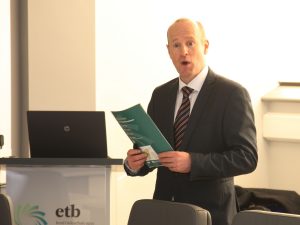The North West Regional Skills Forum (NWRSF) in collaboration with Fasttrack to IT (FIT), launched The Skills Needs of the ICT and FinTech Sectors in the North West 2018 in Donegal ETB’s Letterkenny Training Centre on Friday last. Through close dialogue with industry, the skills audit seeks to better inform the training and education providers in the region about employer requirements in relation to recruitment, training and education in order to maximise tech related employment opportunities in the North West region over the coming years.
CEOs, General Managers, Technical Leads and HR Managers from twenty eight ICT/FinTech companies based in Donegal, Sligo and Leitrim, employing 11,274 people in the region, were interviewed for the research to determine their current and future needs in relation to training, education and recruitment.
The Information and Communications Technology (ICT) and converging financial and technology sectors or ‘FinTech’ sectors are among the fastest expanding industries in Ireland. The European Commission estimates that 90 percent of tomorrow’s jobs will require digital skills. CSO data shows private sector ICT jobs in the North West have grown strongly adding almost 850 additional jobs, which is a growth of 72% in the seven years from 2008 to 2015.
Peter Davitt, CEO, FIT Ltd stated, ‘we have a mini Silicon Valley here in the North West’. He noted that, ‘Robust indicators show that ICT jobs are of growing importance in contributing to the prosperity of the region. Donegal is leading the way in the North West in this regard with 1,645 private sector ICT jobs in 2015 representing 5.4% of total private sector employment. Total ICT jobs in the region have increased from 1,182 in 2008 to 2,023 in 2015 – a conservative forecast of a further increase to over 3,500 in 2020 would be significant.’
In outlining what the FinTech sector looks like globally and in Ireland, Pramerica Ireland’s Director of Financial Services, David Roche, noted that ‘Tech is reshaping the financial industry today – this is FinTech; Forbes has estimated the global FinTech landscape reaches over 1,000 companies, with $105b in funding and $867b in value.’
Chief Executive of Donegal ETB, Anne McHugh, in welcoming the research noted that, ‘it will inform the planning and delivery of our Further Education and Training (FET) courses in this area in the coming years.’
Both Thomas Dowling, Head of Department of Computing and Michael Margey, Head of School of Business both in LYIT were highly complementary of the skills report, highlighting how its findings have been instrumental in the development of new programmes.
In addition to launching the report, the Regional Skills Forum will also be forming a cluster group comprised of Donegal ICT/FinTech organisations, Donegal ETB and Letterkenny Institute of Technology (LYIT). Regional Skills Forum Manager, Dr Oran Doherty stated, ‘The objective of this group will be to promote working and studying in ICT/FinTech locally. It will also support closer collaboration between industry and local education and training providers in relation to training, education, placements, guest speakers, traineeships, apprenticeships and research. This will support the introduction of new businesses in the region and a unified voice in relation to infrastructure and needs.’ This group will be chaired by Vincent Kennedy, Senior Manager in Sita who welcomed this initiative as ‘an excellent mechanism for bringing industry and education closer together.’ A similar cluster group will be formed in the Sligo/Leitrim area in the coming weeks.
The North West Regional Skills Forum is one of nine Regional Skills Fora, which were established by Government as part of its National Skills Strategy to provide an opportunity for employers and the education and training system to work together to meet the emerging skills needs within the region. The region’s Education and Training Boards (Donegal ETB and Mayo, Sligo and Leitrim ETB) and Higher Education Institutions (Letterkenny Institute of Technology, IT Sligo and St. Angela’s College) along with numerous employers and employer representative bodies are represented on the forum.







 Gaeilge
Gaeilge